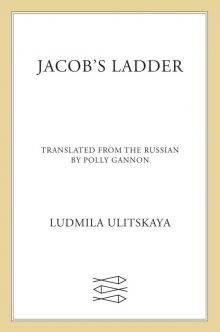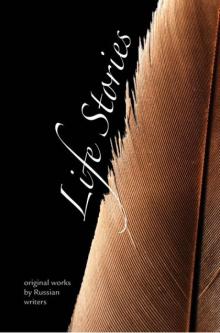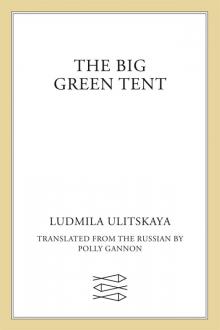- Home
- Ludmila Ulitskaya
Medea and Her Children Page 8
Medea and Her Children Read online
Page 8
Nike shrugged. “A vacationer. He’s staying with Aunt Ada. He looked in yesterday with Nora.”
“Oh yes, of course, I heard someone come in. I put the children to bed and fell asleep myself.”
“And see what a dreamboat you missed. Some hunk!” Nike whispered in Masha’s ear.
“Right, on your feet now, everyone!” Georgii commanded.
Liza started whining and clinging to her mother’s legs. “Mummy, carry me, I’m tired.”
“Walk, walk yourself, you’re a big girl,” Nike said, fending her daughter off absentmindedly.
“Masha, carry me for a bit, eh, Masha?” she said, latching on to Masha.
“Who is he, then?” Masha asked.
“Half-athlete, half-masseur,” Nike grunted. “Don’t get too excited, he’s not your cup of tea. He’s completely thick.” She promptly called over to Butonov, who was standing some way off: “So what’s this, Valerii? Changed your mind at the last minute and decided to catch up with us?”
“Yes, I looked down and saw this nice bunch of people. I thought I must be completely thick to be the only person left behind in the Village.”
Masha and Nike burst out laughing: the man was a mind-reader.
“Have your landlord and landlady gone out?” Nike enquired.
“This is their second day hitting the bottle. They’ve got visitors, and that’s not my favorite occupation,” Butonov replied, unexpectedly primly, having probably sensed something uncomplimentary in the women’s laughter.
Georgii turned to Butonov: “I’ll go first, you bring up the rear.”
Valerii nodded. Georgii jumped down, following the path. Butonov let everyone go in front of him. Masha with Liza on her shoulders went immediately ahead of him. He caught up with her and touched her forearm: “Let me carry your daughter.”
Masha shook her head.
“No, she won’t let you. Take Alik if you like.”
But Alik didn’t want him to either.
Masha felt the spot this athlete or whatever he was had just touched. The skin was burning. She automatically felt her other arm—no, it was only the spot he had touched that was burning. She stopped, took Liza off her shoulders, and said quietly to her: “Liza, walk yourself, I’m not feeling well just at the moment.”
Liza looked at her with her clever eyes. “Shall I carry your bag?”
“Oh, how sweet you are,” Masha said, delighted by such unexpected goodheartedness in the spoiled child. “When I get tired, I’ll ask you, all right?”
It was the start of the section of the path with a sheer drop on one side. Once upon a time, a hundred years ago, there had been a road here which the local smugglers had used to ferry their precious goods out through the coves, and in those days you could drive a bullock cart along it. Year by year the path had crumbled away. The smugglers who had once looked after the road, shoring it up, reinforcing the slopes, had long since died out, some of old age, some more violently, and their descendants had either been deported or become bureaucrats, first in the old tsarist council, then in the district soviet, exchanging one form of criminality for another. Now it was only Medea who remembered the illicit romantic past of these parts, and perhaps a few old Crimeans who had long since moved on, to the Central Crimea if they were lucky.
“In a hundred years or so it will have crumbled away completely,” Georgii remarked.
Medea nodded fairly indifferently. Katya and Artyom seemed not to hear what he had said—for the old and the very young a hundred years, for different reasons, is too long a period of time to be taken very seriously.
Nora, trying not to look to the right, into the ravine, was leading Tanya with hands damp with fear. Tanya had refused a ride on Georgii’s shoulders. Nora was upbraiding herself for dragging the child on such a hazardous outing. It was very, very unwise, but she could hardly be the only one to turn back halfway. Tanya, incredibly enough, was not complaining but, lost in some fantasy of her own, asked periodically, “Mummy, are we going to see a castle?” She couldn’t be persuaded that there wasn’t going to be a castle, only sea.
On the last stretch of the sheer path, however, a castle duly materialized. It was an eroded limestone feature raising gothic spires of different heights toward heaven. The underlying granite of the Karadag spur, igneous tufas, and tertiary deposits combined, as Georgii told them, in a formation of geological strata the like of which was to be found nowhere else in the world. It was as if icicles many meters long were growing upward, in some places vertically, while in others, revealing the prevalence of a wind blowing from one direction, they all inclined the same way, like the tentacles of some gigantic subterranean creature.
“Mummy, look, there’s the castle!” Tanya shouted, and everyone laughed.
This spectacle was so strange that it soon became unbearable. You wanted to move on; it was just too unearthly.
Every time Medea found herself in this spot, she was reminded of the late artist Bogaevsky, whom she had known from her days in the grammar school, one of Theodosia’s many artists and perhaps, after Aivazovsky, the best known. His strange pictures were inspired by these rock caprices, the black and green precipices and pink fractures of Karadag. She did not like the pictures for their falsity and improbableness, yet each time she came back here, she would say to herself, this too was all impossible, completely improbable, and yet here it was, existing in the world, changing shape, dropping large light-colored grains of sand, and down there a small sandy beach had already been formed out of them quite unlike anything else in the neighborhood.
After another thirty meters or so the path gingerly broke away from the cliff and split up into several little winding paths running down to the sea. Here the small children were let down from shoulders, the hands of those who were older were let go of, and through the clefts and past the great uneven boulders they descended and received their reward: in this inaccessible spot the sea was at its purest and most precious, and each time they felt as if they had conquered it anew.
There were two little twin coves, with a thin rocky bridge dividing them. They cut back quite deeply into the coastline, and a number of large rocks jutted out of the sea directly opposite them. Both these coves and the rocks in the sea had had their names changed on many occasions, but in recent decades it had become increasingly common to refer to them as “Medea’s.” At first they had been given the name by Medea’s young relatives. From them the new name was adopted by the postwar settlers, and subsequently also by other people they didn’t know, who, if they had heard of a Medea, knew only the other, mythical one.
Getting down to the water was awkward, over uneven boulders sprinkled with coarse shingle. The rocks were scattered around at random as if this had once been a playground for troll children. Here there were none of the pretty gemstones, chalcedonies, carnelians, the different-colored Crimean jaspers which you found in the Bay of Koktebel; but to make up for it there were any number of light-colored figure-of-eight pebbles with a dark, drawn-in waistband, and quantities of exotic flotsam and jetsam thrown up by storms. And then, right down by the water’s edge, there was the shining white sand with never a tinge of yellow.
They all went down to the sea, abandoning their belongings, and all as one fell silent. There was always this moment of respectful silence in the presence of the relative eternity lapping softly at their feet.
Katya was the first to take off her slippers and proceed with her affected ballerina’s walk down to the water. Now that she was walking with her back turned to Artyom, he could at last look at her without fear of catching her hostile, mocking glance. But even looking at her back, it was obvious she had no need of anyone or anyone’s friendship.
Artyom was suffering, looking at her erect back and her little head with its sleek bun on the very top, à la Mary Poppins. She bent her body as she picked her way over the stones, turning her feet so that the toes pointed outward, and her firm calves, convex on the inside, gave a little wobble at every step. She walked along the
water, and she too was suffering even as she indulged herself. She knew that she was walking well, but the only person looking was that utter drip Artyom, while Uncle Georgii, if he was looking at all, would be looking disapprovingly, and that new neighbor didn’t even know she was there. She walked on, the spirit of ballet incarnate, but the most dreadful thing that could happen had already happened: she had been expelled from ballet school because her jeté was hopeless. She could turn out her feet splendidly, her allongé was fine, but her jeté was a flop. More specifically, she could walk weightlessly, as if she were flying, but on stage her ballon was leaden and her teachers knew it would never improve. She stepped into the water by the shore, which was gently stirring pink seaweed brought from far away; she ran her ballerina’s foot over it, and it was cold to touch but with a pleasant velvety feel.
“Is it very cold?” Nike called to her daughter.
“Eleven degrees,” Katya replied unsmilingly.
“Terrible!” Nike exclaimed.
“When it’s thirteen it’s all right for swimming,” Masha remarked, heading for the water.
The littlest ones, all three of them, followed after her. Alik was leading Liza with one hand and trying to take Tanya’s hand with the other.
“We’ve got a lady’s man in the making,” Nike murmured.
“What do you mean! He’s just very kindhearted,” Georgii protested.
Nike was about to make a further reply, but suddenly Medea’s voice was heard. “I like this latest generation of children. These two, and Tom’s little Revaz, and Brigita, and Vaska.”
“But aren’t they all the same?” Nike asked in surprise. “Are these really any different from Katya and Artyom, or from us when we were little?”
“There was a time when generations were counted thirty years apart, but now I think they change every decade. Katya, Artyom, Shusha’s twins, and Sofiko—they are very purposeful. They will be businesspeople. But these little ones are so tender, so full of love, for them relationships are everything, emotions …”
Medea had no time to finish speaking before a shriek came from Liza down at the water’s edge: “Let go, let go of his hand! Make her let go of him!”
Liza was trying to pull Alik’s hand out of Tanya’s, and Tanya, with her head lowered, was pulling it toward herself.
Everybody laughed. “Women!”
Nora rushed to Tanya, caught her up in her arms, and started whispering something to her. Only a few days had passed since she had met these people, and she liked them all; she felt drawn to them, but she couldn’t understand them, and somehow they treated their children differently from the way she treated her daughter.
“They are too strict with the children,” she thought in the morning.
“They give them too much freedom,” she concluded in the afternoon.
“They spoil them terribly,” it struck her in the evening.
Admiring them, envying them, and disapproving of them all at the same time, she had not yet worked out that they apportioned part of their lives to their children but not all of it.
“Collect some firewood, Artyom,” Georgii quietly ordered his son.
The boy blushed. His father had noticed him staring at Katya. He bent down and picked up a splintered plank which a storm had brought in.
“Collect it higher up, there’s a lot of dry stuff there,” Georgii advised, and Artyom went back up the shore, relieved.
Georgii himself picked up two water churns.
“I’ll come and get the water with you,” Butonov offered.
Georgii would have preferred to go on his own to this ancient place which Medea had pointed out to him when he was a boy but, out of politeness, did not object.
It had the makings of a warm, even hot day. In this hidden spot, as Medea had long known, the natural world lived more intensely: in the winter it was colder here, and in warm weather hotter; in this seemingly sheltered spot the winds whirled with furious force. And the sea cast up onto the shore unheard of rarities: fish which no one had seen on this coast for a hundred years; shellfish, cockles, and mussels which inhabited the depths of the sea, and little starfish the size of a child’s hand.
Medea put on her bathing costume. It had been a daring novelty of Parisian fashion in 1924, and had been brought to Medea by a certain literary celebrity of those years. The whole outfit had completely lost its color and had short little sleeves and something resembling a skirt. It had all been skilfully restored by Nike with the aid of scraps of navy blue and maroon knitted material, and on Medea it did not look ridiculous. Although during the August party, which was always held at the house to celebrate Medea’s birthday and the end of the season for the children, when Medea had an endless queue of people wanting to wear it, the costume looked totally clownish on anybody other than herself.
“Are you going to swim?” Nike asked in surprise.
“We’ll see,” Medea replied noncommittally.
Nora felt a pang when she thought of her own mother, prematurely aged, her swollen white legs lined with blue veins, hysterically and frantically embattled with the evils of old age, her constant tearful demands and ultimatums, her insistent advice and recommendations.
“Lord, what incredibly normal human relationships. There’s nobody demanding anything from anyone else, not even the children,” she sighed.
At just this moment the wailing Liza rushed to her mother demanding that Tanya should without delay surrender a pipefish which they had just found, because she saw it first but Tanya had grabbed it. Nike was sitting cross-legged. She didn’t turn a hair, only rummaged behind her and, without looking around, pulled a flat stone from behind her back, adroitly picked out of a pile of pebbles a little reddish one, and started rubbing the red one over the grey one. She did not try to calm her daughter, made no attempt to resolve the dispute fairly, and accordingly Nora, who was all ready to try to persuade her daughter to show magnanimity and hand over the shell, also stayed seated.
“I’m just going to draw something, but you’ll never in your life guess what,” Nike said into space, and Liza, still shedding tears, was already following the deft movements of Nike’s hand.
Her mother shielded the drawing with her hand, and Liza moved around to the side of her to get a peep. Nike turned away.
“Mum, show me,” Liza begged.
Nora was overcome by admiration of Nike’s pedagogical abilities.
A little later the same day she was again filled with admiration for her abilities, this time culinary. On a campfire, in an ancient battered pot, Nike made a soup out of dried packet soups into which she threw heaven knows what: crumbs and bits of bread swept off the table after breakfast and wrapped in a linen cloth, chopped leftover pieces of yesterday’s sorrel, and even hard little leaves of thyme picked on the way down to the cove.
This was the Medea or, more accurately, the Matilda school of culinary art, ideally suited to the larger family of slender means. To this day Medea never threw anything out, even making a crunchy bisque out of potato peelings with herbs and salt: the ideal accompaniment for beer, according to Georgii.
Nora knew nothing of this. She helped herself to soup out of the communal pot with a wooden spoon, placing a piece of bread under it as Medea did; she drank the thick, fragrant broth with a long-forgotten childish hunger and looked over constantly to where the little ones were sitting at a separate rock table. This was another family tradition: feeding the children at a separate table.
“Some more for Medea, please, Nora,” Georgii said, proffering Medea’s empty bowl.
Nora leaned over the pot in confusion.
“Use the mug, the mug, we haven’t got a ladle,” he said.
“They’re a couple,” Nike thought. “A perfect couple. He ought to have an affair with her. He’s been so low these last few years.”
Nike had a hunter’s flair for knowing where the lovebirds were waiting to be flushed out, even other people’s. Yesterday evening she had allocated Butonov to herse
lf. Actually, of course, there was no one else to choose, and he was good-looking, had a fantastic body and an easygoing manner. Admittedly he didn’t have that spark which Nike looked for; and the fact of the matter was that he hadn’t been transmitting any call signals.
“We’ll just have to wait and see,” Nike decided.
Butonov was sipping his soup, speaking to no one, looking at no one. Masha was sitting next to him, looking sad and somehow hunched up. Her arm was still burning, as if it had been slapped, and she wanted to try out his touch again. She had sat next to him quite deliberately, and in passing a spoon and the bread she had touched him twice, but there had been no recurrence of the burn, only a kind of dullness inside her. He was sitting next to her with his body as still as a Buddha’s and radiating a rocklike strength. Masha was fidgeting. She just couldn’t get comfortable, and eventually realized to her disgust that all this fussing was a subconscious attempt to interest him. She put her spoon down, stood up, and went to the sea, and as she went, she threw off the man’s white shirt she had been wearing to shield herself from the sun. She plunged headlong into the water and immediately started swimming, without breathing and thrashing up a cloud of spray with her arms and legs.
“The girl’s quite frantic,” Medea thought.
Butonov looked in her direction. “That water is quite cold.”
“Katya says it’s eleven degrees, and she’s our thermometer,” Nike said, turning to him.
“Ah, you’re up for it,” Butonov noted to himself, directing a sober, steady gaze at her and, without hurrying, went down to the water. Masha was already coming out, shaking her head and getting her breath back.
“It’s like swimming in a hole in the ice,” she said with her teeth chattering.
“Yes, it’s a strong sensation,” Butonov agreed.
Masha lay down on the hot rocks, covering herself with the white shirt. Cold and heat flooded her body simultaneously.
Butonov sat down beside Medea.
“I hear, Medea Georgievna, that you swim all through the winter.”
“No, my dear young man, it must be twenty years since I last did that.”

 Jacob's Ladder
Jacob's Ladder Life Stories
Life Stories The Funeral Party
The Funeral Party Medea and Her Children
Medea and Her Children The Big Green Tent
The Big Green Tent